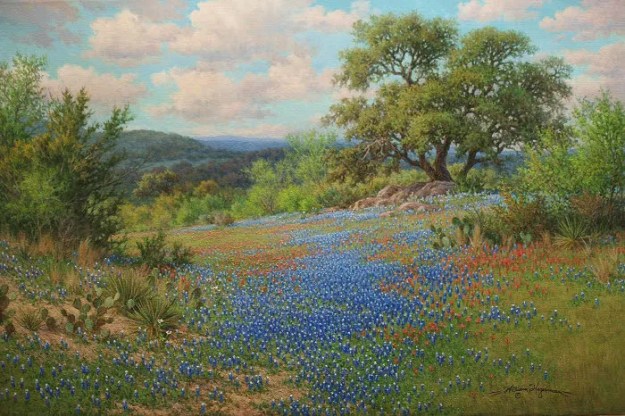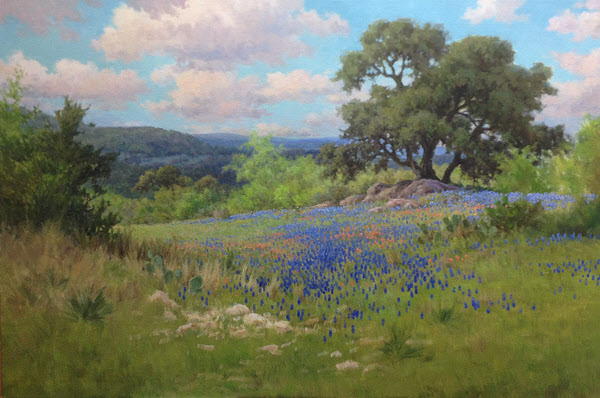Learning how to improve your paintings, often boils down to experience in learning to self critique your work as you work.
Improve your paintings with the right mind-set
To have the right mind-set, think of your painting as a journey in which you want to lead your viewer through your painting without tripping along the path. In other words remove obstacles that could lead in the wrong direction or cause them to stop and stumble.
oil painting demo with a self critique
The following painting demonstration will show you some of my thought processes on how changes were made along the way to remove obstacles. This was a commissioned oil painting for a 24×36 bluebonnet with Indian Paintbrush flowers.
First up is the completed scene of “Interwoven Harmonies,” for reference.
The Journey
The painting’s journey begins as usual with a composition sketch using thinned ultramarine blue paint and a brush. Color is then applied starting with the darker cedar tree for comparison of adjacent areas. My goal before too many details is to cover the canvas as seen in the next photo.
Now that the canvas was covered I began adding details to the distant hills. First adjustment was to remove the dark cedar next to the oak tree as my eye went straight to it and it wasn’t a very important element.
Next more interest was added to the sky. Further analysis: Space division in the distant hills were too similar and uninteresting, so here the hills were modified.
The green grass (paint) has dried and now the pattern of bluebonnets and red Indian Paintbrush can begin.
More flowers are added along with a relocation of the rock patch.
More details and more flowers.
Our cat Hachi, the day before this photo jumped onto my palette and got ultramarine blue and umber on his paws. I told him if he wanted to paint to make himself useful and add in some more bluebonnets for me. I think he’s got some talent. He removed the patchy dirt and took out the yucca type plants on the right. Then he added a patch of dirt around the other cluster of yucca on the left. That was a good idea. However, at this point he told me he no longer wanted to be an artist. Painting bluebonnets was just too much work.
Despite Hachi’s talent he still didn’t address other weak areas. So here I’ve highlighted those stumbling blocks to a viewers journey in the painting.
Here you will see how some of the issues above were handled. Then I encountered another strange visual of an unintended tangent line that was noticeable from a distance in the bluebonnet patch.
Once again here’s the final painting for comparison. You’ll notice that another cloud was added to break the visual line of clouds as well as fixing the tangent line in the bluebonnet patch. Other tweaks were added here and there.
In Conclusion
Painting is about making choices. The end result is you want your viewer to go on the journey through your painting as you intend without tripping them up. Remember, that even if something is there in a reference, you don’t have to put it in. You can add and subtract elements, redesign them to enhance the visual impact of your work. I hope my “self critique” has illustrated that little improvements can make for a bigger visual impact and pleasant journey for your viewers.











Very helpful how you went through and talked about the changes you made and even marked them on the canvas. Thank you. Beautiful painting!
Glad you found this post helpful.
That’s AWESOME Bill ! Love the tutorial and the finished product .
Thanks Tim, glad you liked the tutorial and the finished painting. My client liked it too and is currently having the painting custom framed.